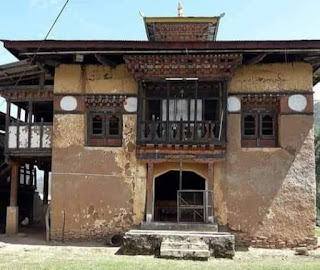COVID-19 TO DZONGKHA: AN UNEXPECTED TURNAROUND
Following Meet the Press program on Covid-19, netizens for a surprise, stormed all over social media and heavily criticized journalists for questioning the Hon'ble Prime Minister in English. On the contrary, the PM succinctly responded to all their questions in Dzongkha. Though the National emergency for now is Covid-19 and not the language per se, there was an unexpected turnaround in the tide of conversation when netizens demanded the journalists to put up their questions in our National language.
Well, certainly, netizens have a point to make though. With advancement in technology, not only BBS the lone mainstream media TV picks up the news clips but the PMO does it as well. The highest office of the Executive has introduced Facebook Live for mass coverage. Meaning, maximum Bhutanese have access to key dialogues such as Meet the Press now. If this be so, it's undoubtedly a formal conversation. More than a formality, citizens have rights to understand the latest happenings in Bhutan especially when media as fourth-estate, plays key role in informing the people on latest important events, happenings and developments. Not many understands English and even if we do, one must care to speak in Dzongkha for this is our National language, netizens argue. Sorry, no middle path. This time I have undone one star out of five on the job of especially newspaper media.
Before the clash between the media and netizens could last any longer, I suppose the fuss was too loud for the virus to bear upon. At least for now, with the imported case departed, we have cleared off with the single reported case, though future is highly unpredictable as weather though as WHO declared the disease pandemic.
With some sigh of relief and out of curiosity, I had to google out a standard meaning of national language and its importance amid national emergency, the virus. That said, we clearly have a fundamental duty to uphold our national language for reasons not limiting to the dictionary's definition I screenshot here. But we need a clear direction. Someone unknown but a friend of mine on messenger argues that Dzongkha is the language of Sha Wang Pa Sum. Frankly speaking, this perception itself is a deterrent to keeping up the national language ‘Dzongkha’. Furthermore, I feel the so called Dzongkha promoters including DDC mustn’t stress too hard on ‘ngagshey’ or ‘accents’ until the nation attains the goal of at least 90 percent full blown Dzongkha speakers speaking at a communicable standard.
By this I mean, there should be variants such as Nga lo pi Dzongkha, Sharcho pi Dzongkha, Lhotsham pi Dzongkha, Khengi Dzongkha and others but not Dzonglish unless too scientific or technical. In England alone, for instance, towns located less than 10 miles (16 km) from the city of Manchester, such as Bolton, Rochdale, Oldham and Salford, each have distinct accents, all of which together comprise the broader accent of Lancashire county. Making mockery of other’s accent or pronunciation is murdering the National language here. When one is made fun of, he or she is discouraged from speaking.
Natives of Sha Wang Pa Sum do not necessarily hold the ownership of ‘Dzongkha’ in anyway, and I must argue, the way natives speak certainly do not meet the standards of Dzongkha if assessed carefully. To name a few, folks of Shaa say ཙོ frequently whilst Parops use མྱ no less. There are hundreds of such words deliberately omitted in dictionary should we focus on standard. Varying pronunciations and accents amongst native speakers could further confuse us. Then one might wonder what the actual standard could be? In my sincere opinion, if all speak Dzongkha at all levels of formal communications in the simplest manner you are comfortable with, this is the standard. Refinement can happen gradually as one picks up the pace and may also catch up the natives if speakers so wish to with some amount of hardwork. We should keep some rooms for evolution to take place.
Most importantly, as viewers so demand, I join them to insist our fellow journalists to make conversation of national importance such as Meet the Press happen in Dzongkha henceforth. Come on, it’s a doable responsibility.



Comments
Post a Comment